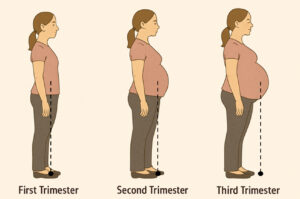Pregnancy, Foot Pain, and Biomechanical Strain: An Overlooked Maternal Health Gap
By: Kelly Robb PhD, C Ped (C)
Pregnancy is a profound journey filled with joy — but it also brings dramatic changes to the body that many women don’t expect, especially when it comes to foot health. Hormonal shifts, weight gain, and changes in posture all add up, leading to foot pain, instability, and altered movement that can affect comfort and mobility throughout pregnancy and beyond. Yet, one simple, proven solution is often overlooked: custom foot orthotics tailored to these unique needs.
Why Pregnancy Changes the Body From the Ground Up
The hormone relaxin plays a starring role in pregnancy, loosening ligaments to prepare the pelvis for childbirth. But relaxin doesn’t stop there — it affects ligaments throughout the body, including in the feet and ankles. This increased ligament laxity can cause fallen arches, joint instability, and overpronation (foot rolling inward). These shifts don’t just cause discomfort—they ripple up the kinetic chain, affecting knees, hips, and lower back.
Studies show up to 70% of pregnant women experience structural foot changes, like arch collapse and foot lengthening, primarily due to this ligament looseness combined with the extra mechanical load from weight gain.
Weight Gain, Posture, and the Strain on Feet
As pregnancy progresses, the body’s centre of gravity shifts forward to accommodate the growing baby. This means more pressure on the feet—especially the arches and forefoot—which often leads to pain, swelling, and flattening of the foot’s natural arch.
To keep balanced, many women naturally adopt a wider stance, increase the inward curve of their lower back, and change how their joints move. These adjustments protect stability but can also increase strain on the knees, hips, and back, making pain and fatigue common complaints.
Swelling and Foot Size Changes: More Than Just Discomfort
Nearly 75% of pregnant women experience swelling (edema), particularly in the feet and lower legs. Fluid retention, combined with pressure from the uterus on veins, slows blood flow back to the heart and causes swelling. While compression garments can help reduce fatigue and swelling, they don’t address how these changes affect foot function or shoe fit.
Many women notice their feet get wider and longer during pregnancy, often requiring a larger shoe size. Along with this, gait changes—like taking shorter, slower steps with a wider base—help maintain stability but also increase fatigue and put further stress on muscles and joints.
The Overlooked Role of Custom Foot Orthotics
Given these predictable changes, custom foot orthotics should be a standard part of prenatal care. Orthotics can:
-
Support arches weakened by ligament laxity
-
Stabilize joints to reduce overpronation
-
Improve posture and gait mechanics
-
Redistribute pressure to relieve pain
-
Enhance balance and reduce fatigue
Yet, many pregnant women are simply told to wear comfortable shoes or rest, without guidance on orthotics designed for their evolving needs.
Most off-the-shelf or even custom orthotics on the market aren’t made to adapt to the rapid and dynamic changes during pregnancy—like ligament looseness, weight gain, swelling, and altered gait. Fixed orthotics can become uncomfortable or ineffective as feet grow and change.
Supporting Women During and After Pregnancy
The need for adaptive, pregnancy-specific orthotic solutions continues postpartum. Foot structure and biomechanics often don’t return to pre-pregnancy norms, especially after multiple pregnancies or cesarean sections. But care often ends once the baby arrives, missing a critical window where orthotics could help with recovery and ongoing pain or instability.
Moving Toward a New Standard in Maternal Foot Care
Pregnant women deserve more than generic advice. Their foot health should be recognized as a vital part of prenatal and postpartum care, with support evolving alongside their changing bodies.
Custom orthotics designed to adjust through pregnancy stages can reduce pain, improve balance, and prevent long-term issues. By supporting the entire kinetic chain—from feet to hips and back—we can help women maintain comfort and confidence from pregnancy through recovery.
Closing the Gap
Pregnancy challenges the body in complex ways. Recognizing and addressing the biomechanical impacts on foot health with evidence-based, adaptive orthotic care can transform comfort and mobility for expectant and new mothers.
For clinicians and orthotic manufacturers, this means embracing pregnancy and postpartum as a distinct clinical category—one that demands innovative, tailored solutions.
It’s time to step up maternal health care, from the ground up.

No Comments